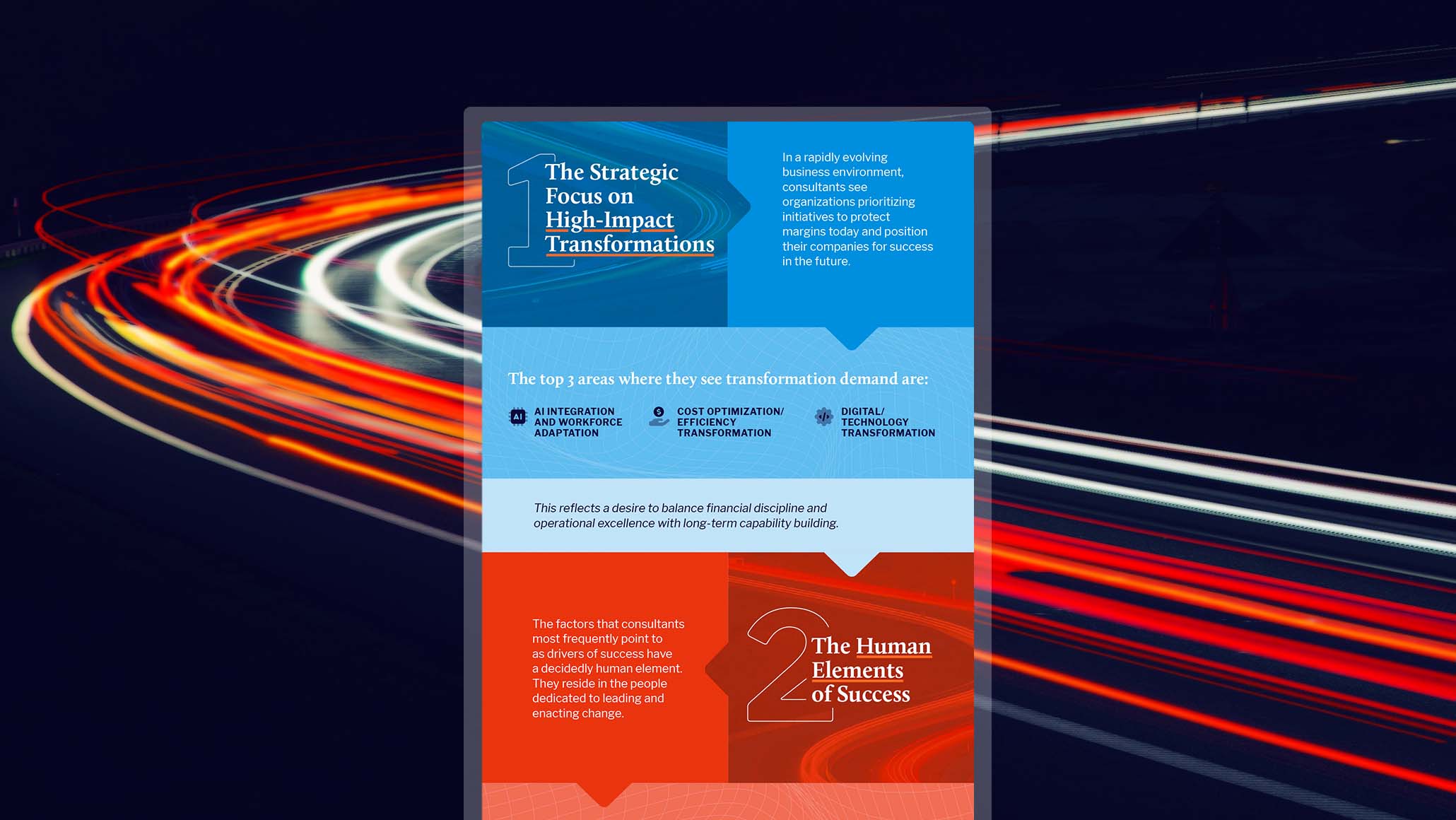The AI-Powered Consultant: What Works and What’s Next

AI is transforming the consulting industry — not in abstract, theoretical ways, but in practical, everyday work. From writing proposals to building agentic assistants, AI is becoming an essential part of how consultants manage their practices and deliver value. But with all its promise comes a set of serious challenges: trust in outputs, messy data, and significant concerns about data security and IP. As AI tools grow more powerful and accessible, consultants are finding themselves as both adopters and translators, responsible for helping clients embrace AI opportunities and navigate their complexities.
Recently, our Catalant team held a panel discussion with three Experts in our Practice Community, digging into how they are using AI in their consulting practices, what common challenges they’ve encountered, and how they are working with clients to navigate the modern AI landscape. These Catalant Experts have backgrounds in machine learning, data analysis, and software development.
Read on for some of the key takeaways from the panel and to learn from the successes and challenges our Experts have experienced using AI.
Real-world applications for AI in consulting
The simplest application for AI is in accelerating the administrative work — developing transcripts and meeting summaries, conducting research, writing emails, and more. However, it doesn’t stop there. Consultants are using AI to speed up deliverables and elevate the quality of client work, especially in time-intensive areas like creating proposals, roadmaps, and pitch decks.
One Expert talked about their effective use of a “collect, synthesize, present” framework for using AI to develop content.
- Collect: This approach starts with AI-powered data collection — in their case, a pendant device that records meetings.
- Synthesize: The synthesis phase leverages powerful LLMs like GPT-4 to process transcripts and generate first drafts of content. A “human in the loop” (HITL) approach is also used for more in-depth analysis and decision making.
- Present: Finally, AI presentation platforms such as Gamma transform content into clean, simple decks with appropriate imagery and formatting.
Depending on the scope of the project, this approach has saved them anywhere from 5 to 20 hours of manual work, enabling them to be far more productive and efficient as an independent consultant.
Beyond content generation, consultants are increasingly applying AI to more complex, data-driven consulting work. Experts gave examples of leveraging AI to tackle challenges such as customer churn reduction, yield optimization, and predictive analytics — applications that go far beyond summarizing notes or generating articles. In these cases, the AI acts more as an analytical engine than a writing tool, working with structured data to surface insights, suggest interventions, or support forecasting.
It’s critical to note that this list of use cases is far from complete, and it’s expanding every day. The AI landscape is changing rapidly, which means there are always new tools to explore and new applications to experiment with. Experts who are using AI successfully are making continuous learning a priority and regularly trying out new tools and techniques to see what works and what doesn’t.
Overcoming common AI pitfalls
While the potential of AI is exciting, the path to reliable implementation is not smooth. Experts who are leading the charge in using AI to support their practices and execute client work have found creative solutions to address the challenges and drive the greatest value from their AI initiatives.
Tool and model selection
Tool and model selection is an area full of trade-offs. While it’s tempting to chase the latest model or benchmark, that is not always the best decision. For a specific client use case, the “best” tool may not be the fastest or cheapest — it may simply be the one that fits existing systems or the one the client can reasonably support. Rather than overengineering or relying on marketing metrics, Experts have seen success favoring lightweight evaluations using real client data and a practical eye toward cost, latency, and accuracy.
Data quality and access
Consultants often find themselves spending more time getting permission to access data — or cleaning that data — than building actual models.
In these cases, Experts have found success by focusing on a small, trustworthy subset of data. Clean, verified slices of data can be just as valuable as large, noisy datasets when the goal is to start delivering value quickly. This approach allows consultants to demonstrate value quickly while avoiding the need for perfect data coverage—a pragmatic strategy that builds client confidence and provides a foundation for expansion.
Hallucinations
One of the most commonly discussed challenges is AI hallucinations. AI often makes things up, and it does so with extreme confidence. That can be dangerous in client-facing work. To mitigate this, Experts suggest using persistent instruction strategies, where they repeat key prompts across sessions with ready-made prompt blocks that include reminders like “use your tools,” “don’t guess,” “look at these sources,” and “cite sources if available.”
Expert tips for mitigating hallucinations:
- Require sources: Prompt AI to provide direct quotes from source materials to support any inferences
- Check links: Systematically verify that provided URLs exist and contain the claimed information
- Use multiple steps: Break complex requests into smaller, verifiable components
- Develop an oversight framework: Implement systematic review processes, especially for client-deliverable content
Output accuracy
Evaluation strategies are equally important. While there are a number of ways to approach evaluation, Experts have found it helpful to start with a trusted “truth set” to compare against and clear success metrics. Outputs can then be checked against this gold standard and scored accordingly — an approach that helps consultants answer the key question: is this good enough?
It’s worth remembering that AI models are exceptional guessers, but they need consistent guidance. Some Experts have adopted the approach of repeating critical instructions within sessions or carrying key prompts across different interactions. Consistent reinforcement produces more reliable outputs and makes it easier to check outputs against each other to validate reliability and accuracy.
Expert approaches for evaluating AI outputs:
- Golden dataset comparison: Measuring outputs against known correct answers
- Human evaluation: Direct human review of outputs against quality standards
- LLM-as-a-judge: Using one AI model to evaluate another’s outputs
- Code-based evaluation: Automated testing against predefined criteria
Data security and protection
Security, infrastructure, and IP protection deserve careful attention. This is a concern both for consultants, who are using AI in their own businesses and have a responsibility to protect their clients’ information, and for the clients themselves, who may be looking for consultants to help build or implement new AI capabilities for their businesses.
When it comes to developing and implementing AI capabilities for clients, some Experts have found that the clients have not yet considered the implications of sending proprietary content into hosted models. Consultants are often the ones flagging these risks, whether they’re around embedding data, model hosting, or privacy policies.
In some cases, our Experts have seen success recommending self-hosted solutions to avoid IP leakage. Others have helped clients evaluate internal tools, such as Microsoft Copilot, which often trail behind public tools in capability but can be safer in controlled environments. The key is helping clients understand that AI services are businesses themselves and that data protection requires active consideration of where information is processed and stored.
Efficiency and repeatability
There is so much to experiment with when it comes to AI, and when something works, it’s important to be able to repeat it. Experts who are focused on saving time by using AI have found success by building systematic approaches to AI interaction through reusable prompt frameworks. Rather than starting from scratch for each engagement, successful practitioners are creating robust prompt templates and instruction sets, making it easier to ensure consistency and work efficiently.
An Expert toolkit for using AI should include:
- Template libraries: Collections of proven prompts for common tasks
- Evaluation frameworks: Standardized methods for assessing AI outputs
- Quality checklists: Systematic review processes for client deliverables
- Escalation procedures: Clear protocols for handling AI failures or limitations
The future of AI in consulting
AI is transforming the consulting industry. Not by replacing consultants, but by redefining how they create value. But while AI excels at speed, scale, and pattern recognition, it lacks the judgment, context, and nuance that clients rely on consultants to provide. AI can be useful but also prone to overconfidence, inaccuracy, or omission without proper oversight. This is where experienced consultants remain indispensable: not just for execution, but for strategic guidance, quality assurance, risk management, and helping organizations adapt to change.
The most effective consultants don’t see AI as a competitor — they see it as a force multiplier. By offloading routine tasks to AI, they free up time to focus on higher-order work such as shaping strategy, interpreting complex results, and strengthening client relationships. This shift demands more than technical skills. It requires the wisdom to know when AI is useful, when it’s unreliable, and how to integrate it responsibly into existing workflows.
Looking ahead, several key trends are emerging. We’ll see deeper specialization as consultants align AI tools with industry-specific needs, the development of better evaluation methods to build trust in AI outputs, and a stronger focus on integrating AI into traditional consulting models. As AI tools become more accessible, the differentiator won’t be access to technology but the ability to apply it with insight, discipline, and impact.
Ultimately, AI is not a shortcut to strategy or a replacement for expertise. It’s a powerful tool in the hands of those who use it wisely. The consultants who will lead in this new era are those who approach AI with both curiosity and caution, embracing its potential while holding fast to high standards for quality and clarity. As the technology matures, these consultants won’t just adapt to AI—they’ll shape its role in driving lasting transformation.
Want to join our Expert community?
Learn MoreRelated Articles
Share Article












